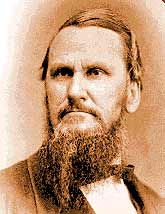‘The rich rules over the poor, and the borrower is the slave of the lender.’ ~ Proverbs 22:7
Allow me to preface this by stating the obvious: I’m no genius. That being said, even I can figure out—based upon Jon’s sermon this past Sunday—that the next Word to be brought to us by Pastor Coleman this coming Sabbath should be that of the Eighth Commandment (‘Thou Shall Not Steal’).
With an eye toward preparation, I read what the Westminster Divines had to say regarding God’s proscriptions in this area. As always, what is written below are merely my opinions and/ or understanding of the issue(s). I do NOT presume to be a theologian, nor (obviously) is my view to be considered authoritative or the final word on the subject. I welcome and encourage opposing viewpoints in the spirit of 'iron sharpening iron.' (Just be nice--I can be made to cry easily.)
‘Q. 142: What are the sins forbidden in the eighth commandment? A: The sins forbidden in the eighth commandment, besides the neglect of the duties required, are theft, robbery … as likewise idleness … wasteful gaming … usury …’ ~ Westminster Larger Catechism
As both Pastors Coleman and Anderson have made clear in recent weeks, Jesus’ purpose in His Sermon on the Mount was to demonstrate our narrow understanding and application of the Ten Commandments by expounding upon their true meaning and intent. The Divines, through their God-given gifts of discernment, have provided additional insights into the Biblical application—and ramifications—of the Ten Words through the Westminster Standards. Still, some of their admonitions are surprising—even puzzling. How are we to equate ‘idleness,’ ‘wasteful gaming’ (gambling), and ‘usury’ with thievery?
At the outset, it is important to understand that theft is more than merely taking that which belongs to another without their permission. In light of the biblical worldview, it means to obtain (or even to seek) something without providing something of equal value in return--in other words, trying to get something for nothing. ‘Labour’ is almost a pejorative term in our culture to-day (which is one of the reasons I dislike using ‘Take it easy!’ as a salutation). While there is absolutely nothing wrong with efficiency, it seems we seek not so much labour saving machines as we do labour eliminating devices. Yet, labour—or ‘work’—is not only necessary, it is preferable, it is commanded, in the life of the Christian. When God created Adam in His image, he established the pattern of work for him as the norm—‘The LORD God took the man and put him in the garden of Eden to work it and keep it (Genesis 2:15). It is important to note that this God-given duty was required of Adam before the Fall. Work is not a penalty for sin, it is the normative condition for man. God makes this explicit in the Fourth Commandment: ‘Six days you shall labor, and do all your work …’ (And, in His mercy, He has provided the Sabbath to us for rest, as well.)
Labour, then, should not be something that we avoid; rather, it should be the normal course of events in the life of a Christian. ‘For we hear that some among you walk in idleness, not busy at work, but busybodies' (II Thess. 3:11). When we are idle—lazy—we are stealing from God inasmuch as we are neglecting to use the time He has given us in being productive and we are stealing from others when we accept handouts in lieu of working and earning what we obtain (‘For even when we were with you, we would give you this command: If anyone is not willing to work, let him not eat’--II Thess. 3:10).
There is an important caveat that needs to be made clear—I am NOT insinuating that charity is unwise or to be neglected. If someone is unable to work or to improve their lot, we are, obviously, to provide succor. As James tells us, true religion is to assist orphans and widows. It is regarding the lazy, not the downtrodden, that I speak. As Paul wrote, 'Let the thief no longer steal, but rather let him labor, doing honest work with his own hands, so that he may have something to share with anyone in need' (Ephesians 4:28).
Now, it may be asked, whereby is it that gambling is considered stealing? Do not those who play the lottery or sit themselves around the gaming table do so willingly—fully knowledgeable that they may (and probably will) lose a considerable amount of their money, if not the entirety? To be sure; yet, they do so no more willingly than do those who consent to an extramarital affair. Consent, then, does not lend moral legitimacy to any action; it is to be judged according to the only standard of faith and practise—the Bible. Again, we refer to the desire to obtain something for nothing. In gambling, the winner gains his purse without providing anything of equal value in return. Risk (in the Presbyterian sense of the word), though it be equal among all participants, does not ameliorate the fact that the gains were had without due exchange. Likewise, the winnings come at the expense of others. One cannot win at games of ‘chance’ (again, in the Presbyterian sense) without the certainty of others losing. It matters not whether the others ‘can afford’ to lose that which they give up. (The fact that we are also called to be good stewards of the gifts God provides us and that the vast majority of those who play are those who can afford to lose their money the least is another argument altogether.) To win, then, means that you gain without labouring or without providing something equal in value in return.
The next issue, that of usury—charging interest on a loan—is one dear to my heart. Jesus addressed the issue in Luke 6:35—‘But love your enemies, do good to them, and lend to them without expecting to get anything back.’ Likewise, in Exodus 22:25 we are told: ‘If you lend money to any of my people with you who is poor, you shall not be like a moneylender to him, and you shall not exact interest from him.’ The charging of interest is the norm to-day, so why should we be wary of it? It is because, in light of what we read in the Larger Catechism, it is obtaining something for nothing. It is to exact a profit from another without labouring for it; without giving something of equal value in return.
That being said, John Calvin draws a distinction between usury in personal versus business exchanges. In providing capital in a business venture, Calvin insisted, a person is providing something of equal value to the businessman—he is providing the water to prime the pump of the venture which, Lord willing, will turn a profit via a successful business for the borrower. It is only right to expect a return for the lending in such a case. I struggled with the distinction posed by Calvin for some time but, after much study, thought, and prayer, I have come to agree with his view. As long as the interest is charged on money used in a business venture, and not for that of a personal nature, it does not seem to me to violate the commandment in question.
Usury, or compound interest as it is known more widely to-day, is a beast that we should all slay. Sadly, most Christians to-day strain under a mountain of debt that produces worry, anxiety, and stress in our lives. As indicated in the Proverb cited above, usury is the stick wielded to keep us slaves to our debtors. I would urge all of my brothers and sisters to get out of debt—and stay out of debt. As Paul admonished the Romans: ‘Owe no one anything, except to love each other …’
Sunday, August 12, 2007
Subscribe to:
Post Comments (Atom)






No comments:
Post a Comment